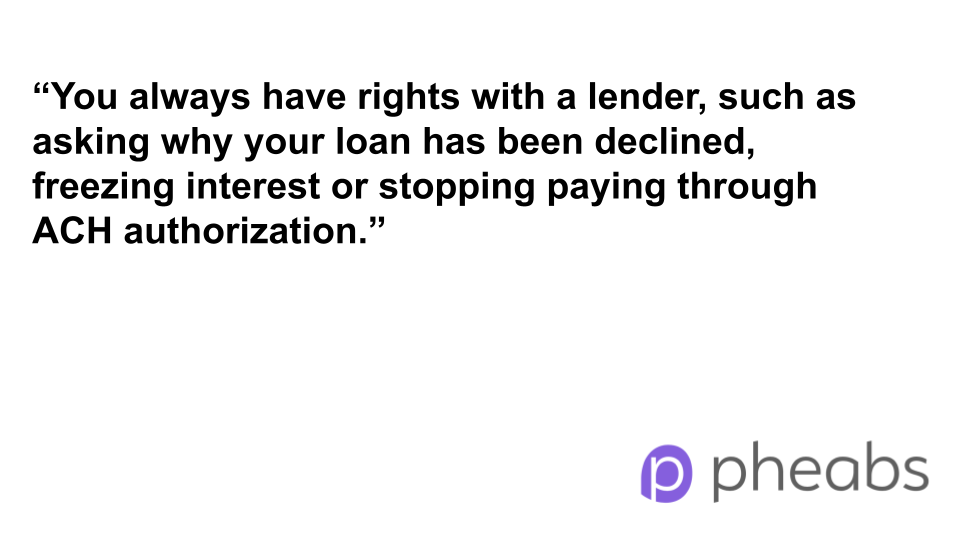With millions of Americans borrowing money across credit cards, payday loans and secured loans every year, around 20% of people will default each month on payment and find themselves being pressured for repayment by their lender.
Many households will feel the pressure of phone calls, messages and arrears letters, whilst not being aware of what rights they have as a consumer and how they can diffuse the situation and get back on their feet.
We provide a guide below to give you a better understanding of your rights as a borrower if you are facing financial difficulty.
What You Can Ask a Lender To Do
- Ask why your loan has been declined
- Ask a lender to freeze repayment
- Make a minimum repayment
- Ask a lender for an arrangement to pay
- Stop automatic payments from leaving your account
If you are starting the process of getting a credit card or loan and have been declined, you can ask the lender via email or phone why your loan was rejected. Typically, you will just be told on the screen or email that you have been declined, but you have a right as a consumer to ask why this was. This could offer some powerful insight into how lenders view your financial position, whether it shows shortcomings in your credit status, affordability or other.
If you are struggling to repay your loan, whether it is a personal loan or mortgage, you can ask for the lender to freeze the interest, provided that you have asked a few days in advance. Depending on the terms and conditions, there may be a window where you can ask for payment to be deferred to a later date and for interest to be frozen, so no extra interest is added. However, late fees may apply if you are late with payment, depending on the type of loan and lender.
You may be able to request a payment holiday. Whilst this is less typical with personal and unsecured loans, you can certainly request a holiday or ‘month off’ from a mortgage – and you may be eligible for a certain number of these per year.
Equally, you may be able to make a minimum payment on your loan (and this is typical for credit cards), so you only pay a sum such as 10% of the month’s outstanding balance and it does not charge any additional fees on top or put your account into arrears. However, please note that the full amount outstanding will still be due to repayment at some point.
Furthermore, if you are unable to keep up with repayments for this month for your personal, secured or unsecured loan, you can request for an ‘arrangement’ or ‘arrangement to pay.’ This will break down your loan into smaller amounts and over a longer period of time, to hopefully make it more affordable. This will be reported on your credit score and this may fall as a result. However, you should avoid any penalties or added interest on top.
Finally, if you have recurring payments set up with your bank account and would like to stop the lender from taking repayments this month and next, you can request the lender to stop taking payments and ask your bank too. This is known as ACH authorization. Perhaps you do not want the lender to collect money from you this month because you need those funds for yourself or want to pay off other debts. You have the right to stop the lender taking money, but note that this could put your account in arrears and will still be subject to repayment at some point.
Can a Lender Repossess Your Home?
If you have taken out a secured loan or mortgage and are far behind on your repayments, the lender may have the right to repossess your home. This will be important for the lender to recover any money that they have lent out to you so far.
Repossession is costly for lenders, so it will be a last resort and the company will usually take a number of other steps such as emails, letters, phone calls and arrangements to pay before succumbing to repossession.
Can a Lender Take You To Court Over Missing Repayments?
Whilst not common, it is possible for a lender to take you to court in order to collect missed repayments – and doing so will result in placing a county court judgement (CCJ) on your credit report which stays there as a reminder for 6 years.
Again, this is a last resort and something that lenders will do if they have not been able to recoup their funds through other means of communication.
How to Stop The Phone Calls and Letters
If you are behind on your payments and are being bombarded with phone calls and letters and wish these to stop, you can take the following steps.
Speak with the lender – Being in regular communication with the lender can help ease the burden. As regulated entities by the FCA, they are required to offer forbearance and help you if you are struggling. By not speaking to the lender, you are encouraging more methods of communication for them to try to recover their funds.
Clear your account – Once your account and balance has been cleared, the lender will stop contacting you. It may not be feasible to clear your account, but there are methods to consolidate debt including balance transfer credit cards and debt consolidation loans.
Enter debt management – If you are struggling with multiple debts, you can enter debt management with a professional company. This firm will combine all your debts and create an affordable budget to pay them off one-by-one. They will write to each lender and this will stop any further communication.
Get free and impartial advice – You can get free debt advice from the likes of ConsumerCredit.com and NFCC.org.





